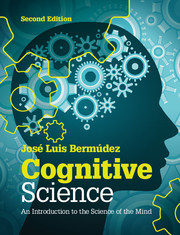Cognitive Science (2nd Ed.) An Introduction to the Science of the Mind
Langue : Anglais
Auteur : Bermúdez José Luis

Cognitive Science combines the interdisciplinary streams of cognitive science into a unified narrative in an all-encompassing introduction to the field.
Cognitive Science combines the interdisciplinary streams of cognitive science into a unified narrative in an all-encompassing introduction to the field. This text presents cognitive science as a discipline in its own right, and teaches students to apply the techniques and theories of the cognitive scientist's 'toolkit' - the vast range of methods and tools that cognitive scientists use to study the mind. Thematically organized, rather than by separate disciplines, Cognitive Science underscores the problems and solutions of cognitive science, rather than those of the subjects that contribute to it - psychology, neuroscience, linguistics, etc. The generous use of examples, illustrations, and applications demonstrates how theory is applied to unlock the mysteries of the human mind. Drawing upon cutting-edge research, the text has been updated and enhanced to incorporate new studies and key experiments since the first edition. A new chapter on consciousness has also been added.
Preface; Part I. Historical Landmarks: Introduction to Part I; 1. The prehistory of cognitive science; 2. The discipline matures: three milestones; 3. The turn to the brain; Part II. The Integration Challenge: Introduction to Part II; 4. Cognitive science and the integration challenge; 5. Tackling the integration challenge; Part III. Information-Processing Models of the Mind: Introduction to Part III; 6. Physical symbol systems and the language of thought; 7. Applying the symbolic paradigm; 8. Neural networks and distributed information processing; 9. Neural network models of cognitive processes; Part IV. The Organization of the Mind: Introduction to Part IV; 10. How are cognitive systems organized?; 11. Strategies for brain mapping; 12. A case study: exploring mindreading; Part V. New Horizons: Introduction to Part V; 13. New horizons: dynamical systems and situated cognition; 14. The cognitive science of consciousness; 15. Looking ahead: challenges and applications; Glossary.
José Luis Bermúdez is Dean of the College of Liberal Arts and Professor of Philosophy at Texas A&M University. He has been involved in teaching and research in cognitive science for over twenty years, and is very much involved in bringing an interdisciplinary focus to cognitive science through involvement with conference organization and journals. His 100+ publications include the textbook Philosophy of Psychology: A Contemporary Introduction (2005) and a companion collection of readings, Philosophy of Psychology: Contemporary Readings (2007). He has authored the monographs The Paradox of Self-Consciousness (1998), Thinking without Words (2003), and Decision Theory and Rationality (2009) in addition to editing a number of collections including The Body and the Self (1995), Reason and Nature (2002), and Thought, Reference, and Experience (2005).
Date de parution : 03-2014
Ouvrage de 552 p.
19x24.6 cm
Ancienne édition
Accéder à la nouvelle édition.
Date de parution : 03-2014
Ouvrage de 553 p.
19.3x25.2 cm
Épuisé
Thème de Cognitive Science :
© 2024 LAVOISIER S.A.S.



